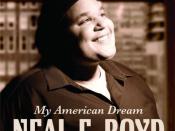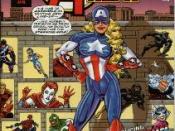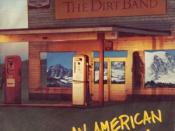This passage is the last three paragraphs of the story. The passage is Nick's thoughts on Gatsby and the future. This passage ends the story and concludes Nick's narrative. It happens while Nick is going home to Minnesota in a train. It illustrates the main theme of the un-attainability of the American Dream.
In the first sentence of the passage, Fitzgerald uses the word "brooding" to show the mood of Nick, the narrator. Brooding gives an impression of deep, dark thinking. Next, he talks about the green light at the end of Daisy's dock, a symbol that pervades the writing throughout the work. It symbolizes Gatsby's hopes and dreams for the future. Fitzgerald uses the word "wonder" to show Gatsby's excitement for his future with Daisy. Fitzgerald also uses the word "obscurity" to describe the land west of New York. This gives the tone a careless tone because Nick doesn't explain what he really means.
Nick also proceeds to call the Midwest "the dark fields of the republic." In the second paragraph, Fitzgerald mentions the green light again, calling it "the orgastic future." This description shows the expectations everyone has for future, but only a few people attain it. The diction of the second paragraph adds to the tone of the passage, showing the un-attainability of the American Dream. The last paragraph is only one sentence and is also the last sentence in the book. Fitzgerald uses this sentence to show that the "current" is flowing towards the East, and hence corruption. He uses the word "ceaselessly" to describe the movement of time into the past. Nick's physical movement west is also his movement into the past and traditional values.
Fitzgerald's word choice affects the mood of the passage in many ways. In the first paragraph, Nick sounds...


